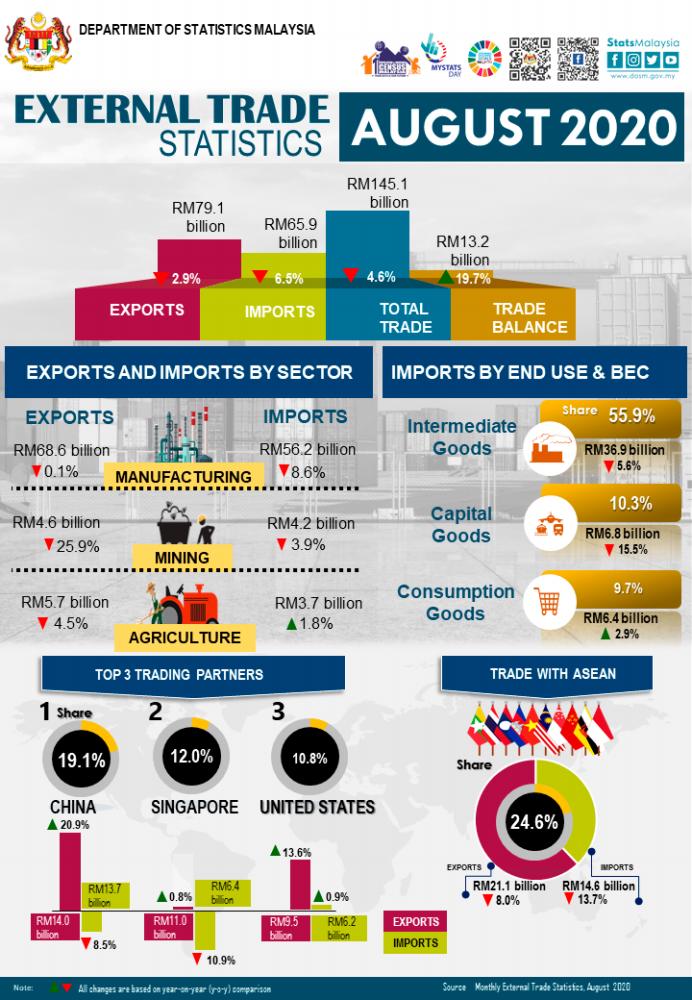PETALING JAYA: Malaysia’s exports in August 2020 slipped 2.9% year-on-year (y-o-y) to RM79.2 billion, as domestic exports declined 5.2% to RM64.6 billion.
Chief statistician Malaysia Datuk Seri Dr Mohd Uzir Mahidin said the decline in exports was attributed to lower exports to Bangladesh (-RM1.5 billion), Thailand (-RM978.0 million), India (-RM726.7 million), Japan (-RM693.9 million), and Indonesia (-RM541.8 million). However, exports to China and the US increased by RM2.4 billion and RM1.1 billion respectively.
The main products which contributed to the decrease in exports were liquefied natural gas (-RM1.5 billion), manufacture of metal (-RM1.2 billion), chemical and chemical products (-RM1.1 billion) and petroleum products (-RM862.4 million). However, exports of electrical and electronic products and rubber products increased by RM2.3 billion and RM1.5 billion respectively.
However, re-exports was valued at RM14.6 billion, registering an increase of 8.5% y-o-y and accounted for 18.4% of total exports. Imports amounted to RM65.9 billion, a contraction of 6.5% from August 2019.
With this, Malaysia’s trade surplus grew 19.7% in August 2020 to RM13.2 billion compared with August 2019, the third consecutive months of trade surplus after a deficit in April 2020 and exceeding RM10 billion for the seventh time in this year.
Total trade fell 4.6% y-o-y to RM145.1 billion, as lower trade was recorded particularly with Thailand, Bangladesh, Indonesia and Japan. Higher trade was registered with the US, China and Saudi Arabia.
Meanwhile, lower imports were mainly from China (-RM1.3 billion), Korea (-RM998.7 million), the European Union (-RM878.2 million), Thailand (-RM787.6 million) and Singapore (-RM780.2 million). However, higher imports were recorded from Taiwan (+RM571.8 million) and Switzerland (+RM398.4 million).
While decreases in imports were noted for chemical and chemical products (-RM1.6 billion), transport equipment (-RM1.5 billion), petroleum products (-RM1.3 billion) and iron and steel products (-RM1.2 billion).
Meanwhile, the decrease in imports by end use was attributed to intermediate goods and capital goods. Imports of intermediate goods dropped by 5.6% or RM2.2 billion to RM36.9 billion. Capital goods declined by 15.5% or RM1.3 billion to RM6.8 billion. However, imports of consumption goods registered an increase of 2.9% to RM6.4 billion.
On a month-on-month basis, total trade, exports and imports contracted by 9.3%, 14.5% and 2.2%, respectively. Trade surplus dipped by 47.5%.
During the eight months period, exports reduced 5.8% to RM620.64 billion, while imports contracted 7.3% to RM517.66 billion.
In January to August 2020, exports of manufactured goods shrank by 3.7% to RM533.38 billion compared to the same period of 2019, held by lower exports of electrical and electronic (E&E) products, chemicals and chemical products, manufactures of metal as well as petroleum products. However, higher demand was recorded for rubber products, other manufactures especially solid-state storage devices, transport equipment as well as optical and scientific equipment.
Exports of agriculture goods slipped 0.6% to RM43.96 billion on account of lower exports of sawn timber and moulding as well as natural rubber, while exports of palm oil and palm oil-based agriculture products increased. Exports of mining goods declined 27.2% to RM40.46 billion due to lower exports of LNG, crude petroleum as well as petroleum condensates and other petroleum oil.
For the first eight months of 2020, trade surplus rose 2.9% to RM102.98 billion compared to the same period of 2019.
Total trade declined 6.5% to RM1.14 trillion, mainly on lower trade with Thailand, Singapore, India and Japan. Higher trade however was registered with Korea, the US, Bahrain and China.













